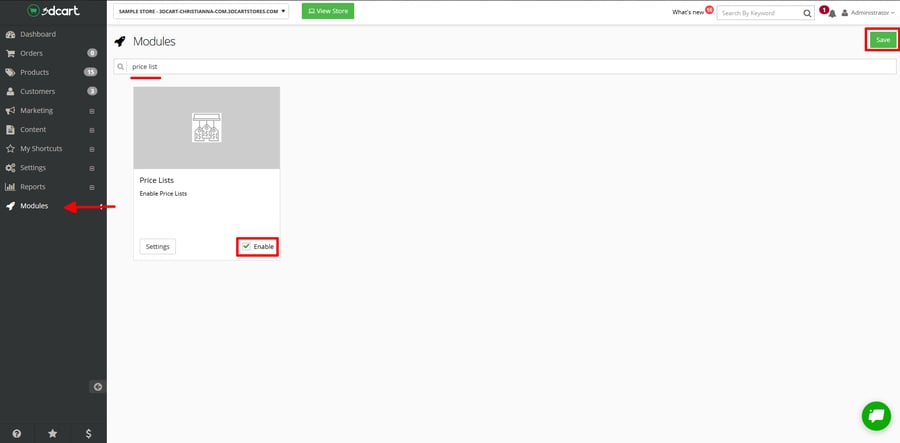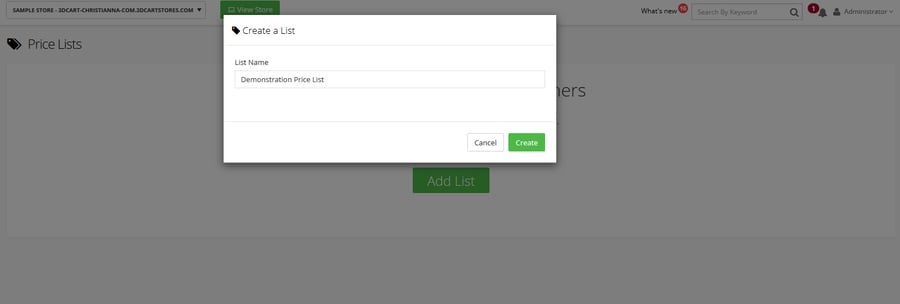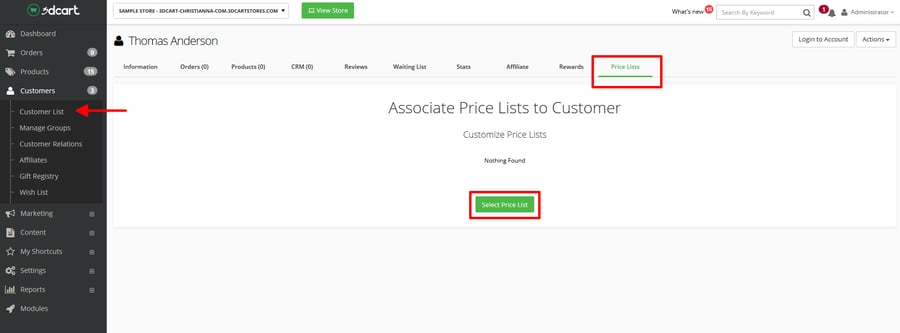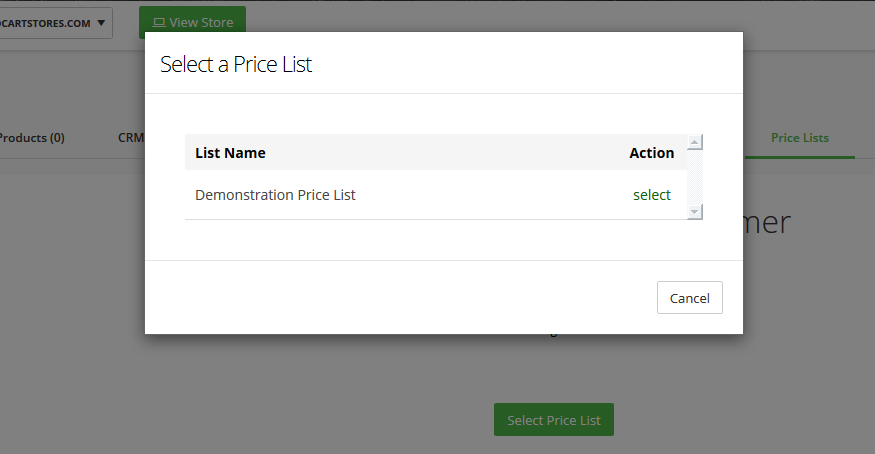
When it comes to running a business, there are some strategies everyone uses. Even with the possibility of a vast difference between industries, things like SEO and email marketing are old standbys, for example. But sometimes, a business will need to use a more uncommon strategy.
This is especially true for B2B merchants, who thrive on building personal relationships with the customers they supply. It's common for B2B sellers to work out customer-specific pricing or other special deals to help build their relationships.
While it's way more common for B2B, some types of B2C merchants can use this strategy as well. For example, an artisan who builds custom furniture might have a special relationship with a particular B2C client. Or, even a regular retail store might want to offer special pricing to a certain customer under specific circumstances.
No matter what, you're going to need the right tools to be able to do this. Shift4Shop has a Customer-Specific Price Lists module built-in. Let's take a look at this feature, how it works, and how you can use it to enhance your business.
What is a Customer-Specific Price List?
A Customer-Specific Price List is simply a list of prices that are only available to one customer. Or, to multiple specific customers that have been assigned to this price list.
If you're familiar with Shift4Shop's Customer Groups feature, you're already aware of one method for offering different pricing to different segments of customers. Customer Groups are commonly used to split B2C and B2B customers and offer them specialized pricing or wholesale discount levels. However, Customer-Specific Price Lists work differently, and can be used completely independently of Customer Groups.
A Customer-Specific Price List can have any number of products on it, each of which you assign a specific price. You then assign the Price List to any customers you want to be able to access those prices. You can also assign multiple Price Lists to the same customers, and have products on multiple Price Lists with different pricing on each.
In short, Customer-Specific Price Lists are made to help you offer perfectly customized pricing to customers as you see fit.
When to Use Customer-Specific Price Lists
Customer-Specific Price Lists come in handy for many different situations. They give you complete control over the pricing you offer individual customers, without needing to change the default price of a product.
Here are some situations in which Customer-Specific Price Lists can be useful to you.
- Offer custom pricing to a customer independent of their Customer Group. With Customer-Specific Price Lists, you don't need to create extra Customer Groups just to fine-tune your pricing for specific customers. Instead, you can simply create a Price List and assign it to them freely.
- Work out special deals on a one-on-one basis with customers. Since you'll have complete freedom to create Price Lists, you can add any number of products, designate their prices on this particular Price List, and decide which customers it applies to. So, you can negotiate exact pricing with customers as needed.
- Have flexible custom pricing ready for customers that meet your requirements. Let's say you have a few products you can offer at a special price to customers if you decide they qualify. However, these customers might not have anything else in common that could warrant creating a Customer Group. With Customer-Specific Price Lists, you can simply create a Price List including these products and assign it to customers without having to group them in any way.
- Working with organizations. Maybe your business works with non-profit organizations or other entities and you want to give them special pricing on certain products (in addition to tax exemption where applicable). Customer-Specific Price Lists allow you to do just that.
These are just examples of various uses for the Customer-Specific Price Lists feature.
Next, we'll go over more details about how Customer-Specific Price Lists work. This will not only explain how to set them up in Shift4Shop — it will also give you more ideas how to use them. By seeing how the feature works, and having the options laid out, you can figure out more ways Price Lists can enhance your business's pricing strategy.
How do Customer-Specific Price Lists Work in Shift4Shop?
You can find Customer-Specific Price Lists in your Modules within the Shift4Shop Online Store Manager. You may find it quicker to use the search bar to locate the module. Once you find it, check the Enable box and then click the Save button at the top right of your screen.
 You can then create your first Price List by clicking the module's Settings button.
You can then create your first Price List by clicking the module's Settings button.
The first step is to simply create the empty list by clicking Add List. Then enter a name and click Create to save the list.
 After you've created the list, you can begin adding products to it. This is easy even if you have a huge product catalog, since you don't have to browse to add items. Instead, you can locate them via search. While creating a Price List, you can search with the following parameters:
After you've created the list, you can begin adding products to it. This is easy even if you have a huge product catalog, since you don't have to browse to add items. Instead, you can locate them via search. While creating a Price List, you can search with the following parameters:
- GTIN (Global Trade Item Number, found under the product's bar code)
- ID/SKU (Product ID or Stock-Keeping Unit as set in your Shift4Shop store)
- MPN/MFGID (Manufacturer Part Number or ID that may be provided by the manufacturer)
- All (search for all 3 parameters at once, a useful time-saver if you have one on hand but don't recall which type of product identifier it is)
 You will need to enter the full GTIN, Product ID or SKU, or MPN or MFGID when searching. GTINs and IDs or SKUs will also include those assigned to Advanced Options among your products, while the MPN will only apply to the product's main MPN.
You will need to enter the full GTIN, Product ID or SKU, or MPN or MFGID when searching. GTINs and IDs or SKUs will also include those assigned to Advanced Options among your products, while the MPN will only apply to the product's main MPN.
Once you've completed your search, a list of applicable products will come up. (Usually this will just be the one product you were looking for.)
Go ahead and add products to the Price List. Once you're finished, use the New Price field on each product on the list to set the price for this particular list. You can delete products from the list at any time by clicking the Action Wheel at the far right of the product's entry in the list.
 Once you're finished creating the Price List, make sure you Save. Now it's time to assign customers to use this Price List. You do this in the Customer List found within the Customers section of your Shift4Shop Online Store Manager.
Once you're finished creating the Price List, make sure you Save. Now it's time to assign customers to use this Price List. You do this in the Customer List found within the Customers section of your Shift4Shop Online Store Manager.
Click the customer's name and you'll then see a new Price Lists tab.
 From here, you can click Select Price List to bring up a window with all the Price Lists you have created. Select the Price List you want to assign to the customer.
From here, you can click Select Price List to bring up a window with all the Price Lists you have created. Select the Price List you want to assign to the customer.
 You can remove Price Lists from a customer later by returning to this tab and clicking the Action Wheel beside the Price List you want to remove.
You can remove Price Lists from a customer later by returning to this tab and clicking the Action Wheel beside the Price List you want to remove.
Can a Product be on More Than One Price List?
You can put a product on as many Price Lists as you desire. Remember the main point of this feature is to be able to conveniently offer customized pricing to customers as you see fit.
If you want to include the same product on multiple Price Lists, no problem. This is part of the freedom to fully customize prices to work with your customer relationships.
The only potential conflict between multiple Price Lists containing the same product is when they're assigned to the same customer. So, here's how that works.
Assigning Multiple Price Lists to Customers
Just as you can create as many Price Lists as you need, you can assign multiple Price Lists to the same customer by repeating the above selection process.
This is handy for making your Price Lists more versatile. With multiple Price Lists set up, you can pick and choose which to apply to a certain customer rather than creating one larger Price List you may use less often.
(However, if you want to create Price Lists only on an individual basis for customers, and never reuse them, that's fine too. It's up to you how to best use this feature.)
A moment ago, we mentioned a potential conflict arising from multiple Price Lists containing the same product and being assigned to the same customer. If a customer has more than one assigned Price List with different pricing on the same product, your Shift4Shop store will default to the highest of the prices present on the assigned Price Lists.
We set it up to resolve this way as a kind of "safety net" to help prevent the possibility of a customer getting lower pricing than you intended, which could mean lost revenue, while still allowing you to overlap Price Lists if you choose.
If you encounter situations where you'd prefer to have the lower price assigned along with the other pricing from the rest of the list, you can always create a new one to handle it.
Create Price Lists More Quickly with CSV Files
Shift4Shop allows more data import and export than any other SaaS eCommerce platform, so we've continued that tradition with the Customer-Specific Price Lists module. You can export your lists at any time to a CSV (comma-separated value) file.
You can also create and upload Price Lists using the same format. It works for both creating new Price Lists and updating existing ones.
For more information on the proper CSV format, check out our Knowledgebase article on Customer-Specific Price Lists. It includes the instructions you'll need.
Customer-Specific Price Lists Can Help Expand Your Business Strategy
At Shift4Shop, we know you need the right tools to give you the freedom to run your business as you see fit. Our Customer-Specific Price Lists module is the latest step in this ongoing mission.
- Customer-Specific Price Lists let you give special pricing on any products to any customer to which you assign the Price List.
- The feature is available in your Modules screen.
- Customer-Specific Price Lists work independently of Customer Groups, with complete freedom to create Price Lists and assign them to customers.
- There are several uses for this module, such as designating custom prices as a part of negotiation while forming a B2B relationship.
- Customer-Specific Price Lists are easy to set up with a built-in search function that allows you to quickly add products to the list. You can search using several different parameters, or all at once.
- The GTIN and ID/SKU search parameters will also look at the Advanced Options (if any) for your products.
- You can add as many products to a Price List as needed, and create as many individual Price Lists as needed, all with custom pricing.
- The same product can be on more than one Price List.
- Customers can have multiple Price Lists assigned to them. If the same product is on multiple lists, the customer will get the highest out of the listed prices.
- You can import and export your Price Lists via CSV file upload or download.
Enterprise and B2B eCommerce have needs that other businesses may not, and we're excited to be able to offer this valuable tool as part of Shift4Shop.





Leave a reply or comment below